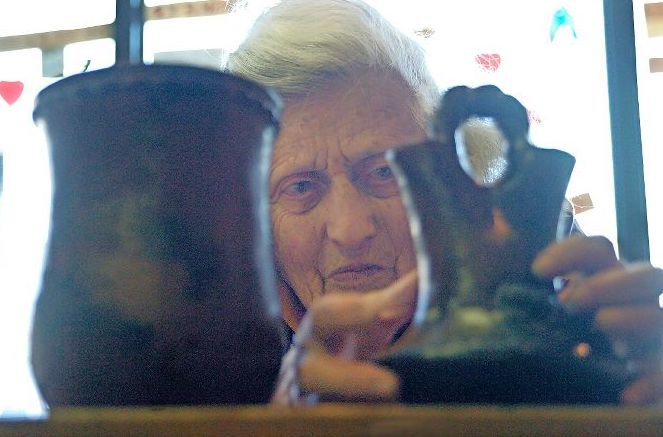Passionate purveyor bids farewell
EDITOR'S NOTE: This story was originally published on April 6, 2006, and was reprinted as part of the 70th anniversary of The Riverdale Press.
You want to remember two things about Shirley Egdal: spirituality and passion. And if you forget, she’ll remind you.
“Passion, passion, passion. That’s what it’s about,” she said.
Ms. Egdal’s passion over the last three decades has been channeled into the Stop-In Country Shop on West 242nd Street, a store that specializes in authentic American Indian crafts, Inuit sculptures, rugs, mineral specimens, and everything in between.
Each March for the past 32 years, she has ventured to the American Southwest, spending months in search of the items that she would bring back to line the shelves of her store when she returned each summer.
But this March, she did not make the annual pilgrimage. And now she’s closing the shop — erasing from Riverdale’s commercial landscape a fixture that has been present since 1974.
Ms. Egdal said she’s moving on for two reasons: “One is that I’m 84. Most people my age are sitting in Florida getting skin cancer. The other reason I won’t tell you because I want to part with the landlord on good terms.”
Though Ms. Egdal hinted that a rent increase may have contributed to her decision, she much prefers to discuss her inventory. And she can do so at length.
Effortlessly, she summons the history and composition of every item in her store.
“That’s buffalo bone, from the Oneida tribe up north.” “That’s a dreamcatcher from the Ojibway tribe.” “That? Oh, that’s from the Mohawk Indians in Canada.”
“Nobody else gives you this, in the whole country,” Ms. Egdal said of her collection. But she seemed to be referring also to her knowledge base, which spans the Native American experience, from New England to New Mexico.
On a recent afternoon, as Ms. Egdal was proudly thumbing through letters she has received from satisfied customers over the years, she noticed three young women — Manhattan College students — admiring a piece of jewelry.
“It’s nice,” said one of the students to her friends.
“It’s more than nice,” Ms. Egdal interjected from across the room, pointing her finger at the choker. “You have to know what you’re looking at. It’s not just a choker. It’s made of cow bone, from the Cherokee Indians in North Carolina.”
Ms. Egdal, with a thick crop of silver hair and a hunched back that puts her height just shy of five feet, is still rather spry, as she demonstrated by hustling over to the young women.
“Girls, come here,” Ms. Egdal commanded. “I’ll teach you all an Indian dance step. Here, take a rattle.”
A look of bemusement crossed over the girls’ faces as Ms. Egdal lined them up, gave them each a rattle, and began the lesson.
“Heel and toe, and ho, ho, ho,” she said from the front of the line. “Bounce as you step! Bounce! There you go.”
Before the students left, Ms. Egdal imparted some of her philosophy about life and her wares.
“I’ve got a sign above my register that says, ‘What’s the hurry?’ These items were not created in a hurry, nor were they collected in a hurry. Sometimes I need to slow people down.”
And she believes that the crafts and carvings she has collected and safeguarded over the years have protected her in return.
One of them hangs on a string around her neck.
“It’s called ‘broken nose,’” she said of the fractured soapstone carving, depicting half of a human face. “I was in a car accident, and the steering wheel hit my chest, breaking the necklace. But the doctor said it provided enough protection that my chest was not severely damaged.”
In 1990, a fire ravaged the stores on each side of the Stop-In Country Shop, but Ms. Egdal’s store suffered only smoke damage.
“I’ll explain why. There are Hopikachina dolls,” she said, pointing to some dolls on a shelf.
“They are believed to be good spirits, and those were the good spirits that saved the store. I had two shelves packed with them at the time of the fire.”
In discussing her past, Ms. Egdal is quick to describe her ancestors, the American Indian tribe that came centuries ago from Russia and crossed the land bridge — now the Aleutian Islands — into Alaska.
Prompted for a more recent chapter of her personal history, she allows that she was born in the South Bronx, and now lives in South Yonkers.
When asked if she has a soft spot for any particular item in the store, Ms. Egdal thinks for a moment, mentally rummaging through the stories that come with each vase, rug and sculpture.
“I have no favorite. But having lived for 84 years, there’s something that draws me to this,” Ms. Egdal said, touching a tiny soapstone figurine of an Inuit wrestling a seal. “It’s something about the struggle of life. The weather they live in. Everything.”
Ms. Egdal expects to close the gate on the store for the last time in mid-May.
Though she would prefer to continue her work — and is open to the idea of working with a partner, were one to come along — she does not dwell too much on the situation.
Instead, she takes a more reflective approach, thinking of her life in terms of her work, her passion.
“Life should be an art form: bold, bright and joyful.”
Did you enjoy this great story from the history of our community? Don't let your newspaper become history. Like many businesses, we're working hard to make it through the pandemic, and appreciate any help you can offer. Donate to keep great journalism like this alive for another 70 years to come by clicking here.






